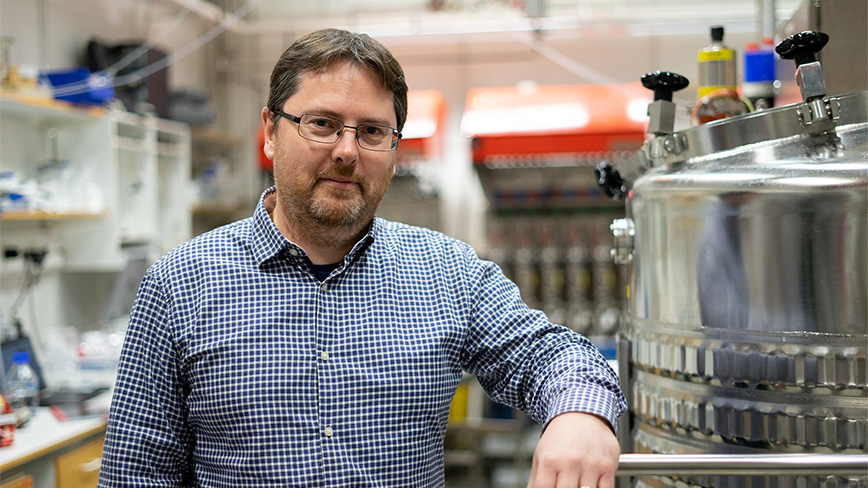“We provide tools and methods to make a sustainable impact on society”

The department of Industrial Biotechnology does research and teaching on sustainable biotechnological production of pharmaceuticals, chemicals and fuels from renewable resources.
”Sustainability is something that industrial biotechnology was contributing to long before it became fashionable,” says Head of Department Antonius Van Maris.
At the department of Industrial Biotechnology, the researchers use materials from wheat straw, sugars that come out of different sources, and wood chips. Mostly leftover materials from agriculture.
“You use sugars and plant materials as resources and, if done well, there is an inherent sustainable component in the process. By using plants instead of oil, the carbon dioxide is fixed again, it is a cycle of few years rather than millions of years with oil,” says Antonius Van Maris.
CBH’s smallest department
Industrial Biotechnology is the smallest department at CBH and has 45 co-workers, of whom eight are faculty members. The research takes place on floor 1 and 2 at Alba Nova and although the department has no divisions, the research focusses on four main areas. To maintain critical mass, each of these topics is led by two faculty members or senior researchers.
A first research topic is the use of microorganisms for production of chemicals and fuels.
“Microorganisms have been used for production for a long time. The research field is not new, but has gained attention during the past 20 years due to the potential for sustainable production and possibilities to make new and improved products through metabolic engineering,” says Antonius Van Maris.
One research example uses the microorganism Clostridium thermocellum to break down plant material, such as wheat straw, to the biofuel ethanol and studies how you can make the process cheaper. This microorganism was isolated from compost heaps and can break down cellulose at high temperatures.
Optimizing the production of proteins
Another topic in the department is the research of associate professor Veronique Chotteau, who with her team optimizes the production of for instance pharmaceutical proteins with mammalian cells. She leads the Vinnova Centre of Excellence AdBioPro, which is a consortium of academic groups and companies working on Advanced BioProduction by Continuous Processing. This topic is an important topic for further strategic development at KTH and the department.
”A third research topic, led by researcher Gunaratna Kuttuva Rajarao and associate professor Zeynep Cetecioglu Gurol, is about microorganisms for cleaning wastewater, drinking water, contaminated (water) environments and circular use of raw materials. Examples of the research are improving waste-water treatment to clean the water before it comes out in the archipelago and studying wetlands at for instance the island Utö to clean the water environment with plants and microorganisms,” says Antonius Van Maris.
The fourth topic within the department is biocatalysis. Biocatalysis specifically uses enzymes to produce pharmaceuticals and fine chemicals in more efficient and sustainable ways.
”One example of an application of biocatalysis is the company Enginzyme, started by former doctoral student Karim Engelmark Cassimjee, who was awarded KTH Alumnus of the Year in 2021.”
In what way does your research contribute to society?
“We provide alternatives for a sustainable production of chemicals, fuels and pharmaceuticals. Industry is where we have the biggest impact. We provide tools and methods to make a sustainable impact on society. This is something that the end consumers do not always see directly, as our improved tools come in one step before,” says Antonius Van Maris.
Passionate about teaching
A passion shared by everyone at the department is teaching.
“All of us really like to teach. We teach in both the biotechnology programme, the master’s programme Industrial and Environmental Biotechnology and in programmes elsewhere at CBH and KTH. I personally really like to transfer my knowledge to our students. Seeing the light in their eyes go on when they understand a new topic. That is why I have chosen to be in academia and not in industry. I like the mix of teaching and research. As I think it should be at a university.”
The department also has pilot facilities to test ideas or develop processes at a scale in between the lab and the final application. This used for contract research for companies, but also to help researchers from other universities and to teach our students.
”Companies can ask us to develop a process to make a protein, or they can want us to study how to make that protein better. It can also be another university that does not have a large bioreactor, and asks us for help,” says Antonius Van Maris.
In addition to a bioprocess pilot plant with a 600 L bioreactor and equipment to concentrate and purify products, the department also uses mobile pilot plants for environmental biotechnology, as well as the Hammarby Sjöstadsverket waste-water treatment pilot plant.
What was your rating in KTH's research evaluation RAE?
“The RAE panel supported our strategic focus on the four topics discussed above, including new recruitments to strengthen these topics. In line with this, associate professor Zeynep Cetecioglu Gurol moved from chemical engineering to join our department in the beginning of this year. Additionally, the department and the school are currently investigating the possibility to strengthen the mammalian cell based bioprocess technology team with a new faculty position on production methods for advanced therapeutic medical products. The panel acknowledged that these four topics cover a wide, but relevant, area of expertise. The main challenge for the department is to further increase the quality of our science and increase the acquisition of external funding. To achieve that, increased collaboration internally, within KTH, but also internationally, will be very important,” says Antonius Van Maris.
Text: Sabina Fabrizi
